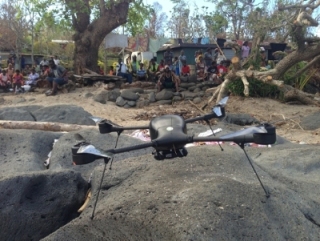Disaster relief missions require a rapid and safe response under harsh conditions. When roads are unavailable, and infrastructure is unstable, unmanned systems can provide valuable damage assessment intelligence without putting further strain on the limited ground and aviation assets available to the response effort.
Following the devastation of Cyclone Pam, the Vanuatu Government and the World Bank contacted Australian operator Heliwest, who deployed Lockheed Martin's Indago small unmanned aerial system (UAS) to conduct a rapid damage assessment. The Indago collected imagery of the damage over a two week mission and provided the data to operators, without risking a life.
 Following the devastation of Cyclone Pam, the World Bank and the Vanuatu Government called upon Australian unmanned aerial system (UAS) operator Heliwest, who deployed Lockheed Martin's Indago small UAS to conduct a rapid damage assessment. (Photo Credit: Heliwest)
Following the devastation of Cyclone Pam, the World Bank and the Vanuatu Government called upon Australian unmanned aerial system (UAS) operator Heliwest, who deployed Lockheed Martin's Indago small UAS to conduct a rapid damage assessment. (Photo Credit: Heliwest)
"Cyclone Pam caused a huge amount of damage and devastation across Vanuatu," said Michael Bonte-Grapentin, senior disaster risk management specialist for the World Bank Group. "To be able to direct support where it's needed most, the Government of Vanuatu, with input from the World Bank and other partners, is developing a post disaster needs assessment. The rapid damage assessments provided by Heliwest offered much-needed information about areas that were damaged by Cyclone Pam, often where ground access is limited and challenging. These images will help inform the Government of Vanuatu in progressing their disaster response activities."
Indago provides operators with an immediate eye-in-the-sky that is capable of providing 360-degree surveillance of an area. Weighing only five pounds, the Indago has an endurance of more than 45 minutes at a range up to 3 miles (5 km) when using its handheld controller. It does not require large bulky cases or specialized transport; rather, it is simply carried in a single backpack with everything required to operate the system.
"In the wake of Cyclone Pam, the Indago was able to navigate through the destruction and provide an accurate picture of damaged property and assets," said Jay McConville, director of business development for Unmanned Integrated Solutions at Lockheed Martin Mission Systems and Training. "The Indago can work day and night to augment disaster relief efforts and humanitarian aid missions to help save lives and begin the recovery process."
"The Indago proved to be the ideal platform for the mission because of its flexibility and small logistics footprint," said Luke Aspinall, manager of special operations for Heliwest. "Heliwest operators were able to deploy a full system by commercial flight with no further support required, while on the ground the Indago allowed us to remain independent and mobile. Our crew were able to get to where we were needed quickly, deploying by a number of methods during the mission including police patrol boats, zodiacs, quadbikes, cars, four-wheel drives, regional flights and light helicopters."
Once deployed, the Indago provided Heliwest operators the capability of several different systems in one package, said Aspinall. Operators could field a mapping capability with similar coverage of a larger fixed wing system due to the Indago's endurance and weather tolerances – without the requirement for large clear areas for launch and recovery.
"With the simple change of a payload, we could provide a stable, high resolution video and oblique imaging with a vertical takeoff and lift capability all in the one package," said Aspinall. "Pairing a true multirole UAS rugged enough to operate in almost all weather with an experienced and professional aviation solutions provider was the ideal solution to a challenging environment like Vanuatu."
Headquartered in Bethesda, Maryland, Lockheed Martin is a global security and aerospace company that employs about 112,000 people worldwide and is principally engaged in the research, design, development, manufacture, integration and sustainment of advanced technology systems, products and services. The Corporation's net sales for 2014 were $45.6 billion.